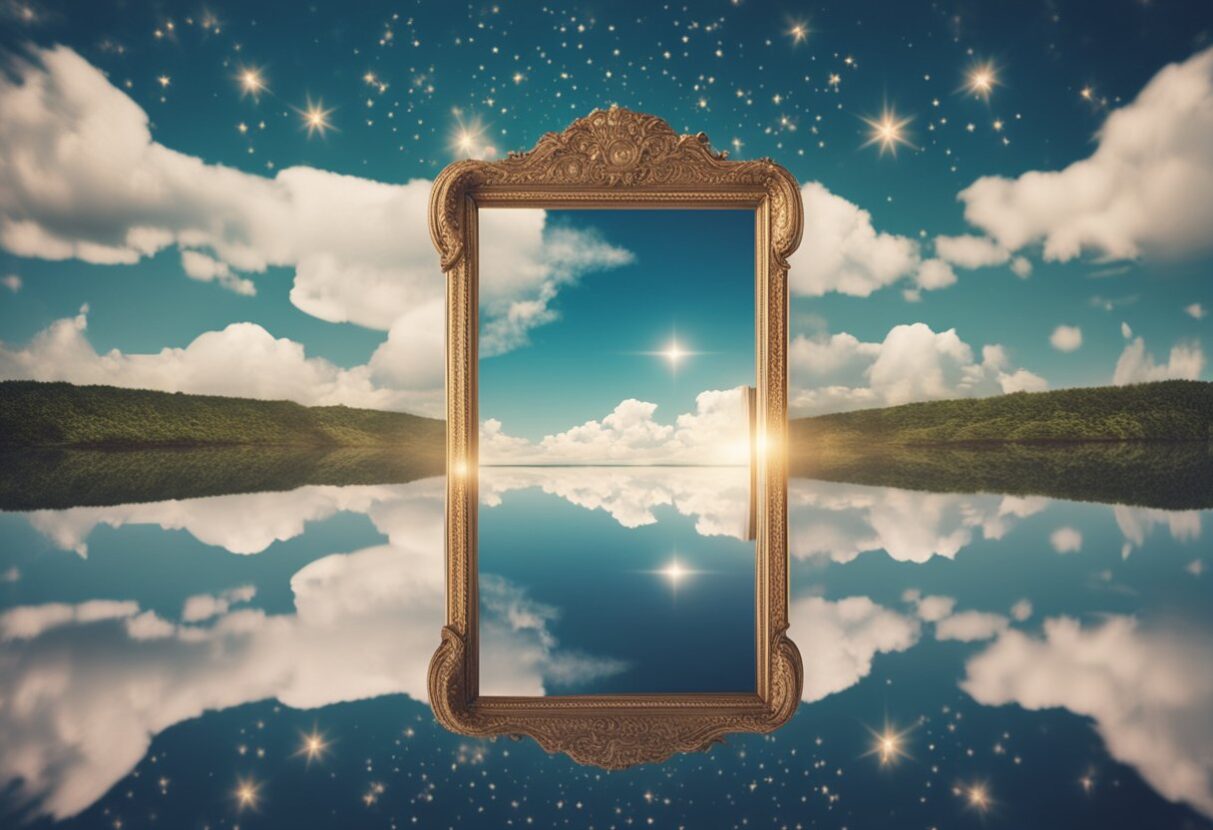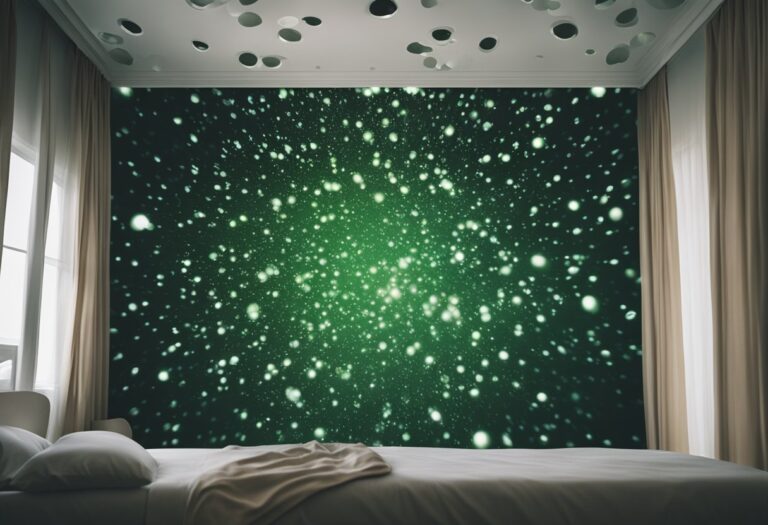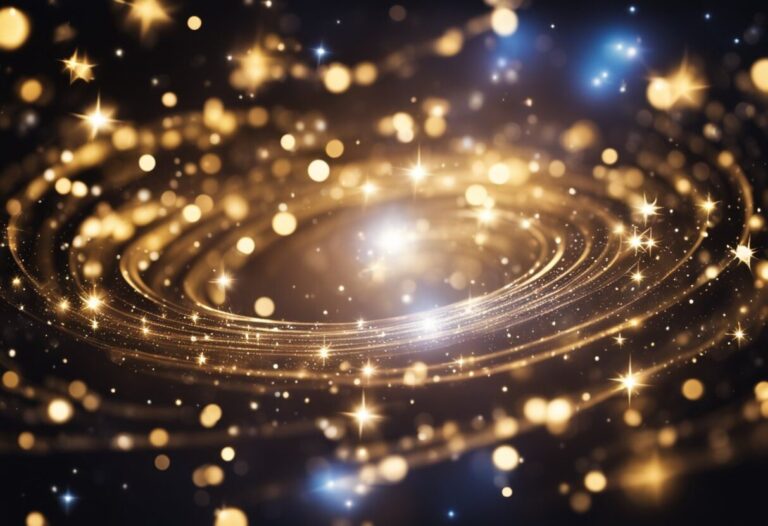Dreaming About Mirrors: Meanings And Interpretations
Understanding Mirror Dreams
Mirror dreams are among the most common dreams that people experience. These dreams can be interpreted in a variety of ways, depending on the context of the dream and the personal experiences of the dreamer. In this section, we will explore the psychological significance of mirror dreams, as well as some cultural and superstitious beliefs surrounding them.
Psychological Significance
Mirror dreams are often associated with self-awareness, reflection, and understanding. When you dream about a mirror, it can be a symbol of your inner self, and can represent your personal reflection. In this sense, mirror dreams can be seen as a way of exploring your inner growth and understanding your own thoughts and feelings.
Mirror dreams can also be interpreted as a way of achieving introspection and truth. They can represent a desire to connect with your inner self and to understand your own consciousness. Mirror dreams can also be seen as a way of exploring your own personal identity and gaining a deeper understanding of yourself.
Cultural and Superstitious Beliefs
In many cultures, breaking a mirror is believed to bring seven years of bad luck. This belief is rooted in the idea that mirrors are portals to the soul, and that breaking a mirror can cause damage to the soul. In some cultures, it is also believed that mirrors can capture the souls of the living and the dead.
In other cultures, mirrors are believed to be a symbol of vanity and pride. For example, in Greek mythology, Narcissus fell in love with his own reflection in a pool of water, and ultimately died because of his obsession with his own appearance.
Overall, mirror dreams can be interpreted in a variety of ways, depending on the context of the dream and the personal experiences of the dreamer. Whether you see mirrors as symbols of self-awareness and personal reflection, or as objects of superstition and cultural belief, mirror dreams can provide valuable insight into your own inner thoughts and feelings.
Common Themes in Mirror Dreams
Mirror dreams are a common occurrence and can hold significant meaning. The following subsections explore the most common themes found in mirror dreams.
Reflections of Self
One of the most common themes in mirror dreams is the reflection of self. Dreams about mirrors often symbolize self-reflection and introspection. When you see yourself in a mirror in a dream, it could mean that you need to take a closer look at your own behavior and actions. It may be time to examine your feelings and motivations, and ask yourself some tough questions about your self-image.
Broken Mirrors
Dreams about broken mirrors can represent bad luck or unfortunate events. Breaking a mirror is said to bring seven years of bad luck, and this belief is often reflected in dreams. If you dream about a broken mirror, it could mean that you are worried about something in your life that could bring bad luck or misfortune.
Dirty or Foggy Mirrors
A dirty or foggy mirror in a dream can represent a distorted self-image or unclear thoughts and emotions. If you dream about a dirty or foggy mirror, it may be time to take a closer look at your thoughts and feelings and try to clear up any confusion or uncertainty.
Specific Mirror Types
Different types of mirrors can hold different meanings in dreams. For example, a hand mirror can represent a desire for self-reflection and introspection, while a bathroom mirror can symbolize a focus on self-image and appearance. Antique mirrors can represent a connection to the past or a desire for nostalgia, while other types of mirrors may hold their own unique meanings.
Mirror dreams can hold a variety of meanings, and it’s important to consider the context of the dream and your own personal feelings and experiences when interpreting them. By paying attention to the specific details of your dream, you can gain a deeper understanding of yourself and your subconscious thoughts and emotions.
Interpreting Mirror Dreams

Dreams of mirrors can be very powerful and can reveal a lot about your inner self. From self-reflection to appearance, dreams about mirrors can be interpreted in many ways. Here are some of the most common interpretations of mirror dreams.
Dreams of Self-Reflection
When you dream of seeing yourself in a mirror, it is often a sign of self-reflection. It may be a reminder to take a closer look at yourself and the situations you are facing. You may be trying to understand yourself better or trying to see yourself for who you truly are. Dreams of self-reflection can also represent your desire to improve yourself or to make changes in your life.
Dreams of Others in Mirrors
If you dream of seeing someone else in a mirror, it could mean that you are worried about how others see you. It could also mean that you are projecting your own feelings onto others, or that you are trying to understand someone else better. Additionally, seeing someone else in a mirror could represent your desire to see that person in a new light or to see them for who they truly are.
When interpreting mirror dreams, it is important to pay attention to the details. For example, if the mirror is cracked or broken, it could represent a distorted self-image. If the mirror is clear and bright, it could represent a positive self-image. Similarly, if you are seeing yourself in a distorted or unflattering way, it could be a sign that you need to work on your self-esteem.
In conclusion, dreams about mirrors can be interpreted in many ways. They can represent self-reflection, a desire to understand others, or a distorted self-image. By paying attention to the details and your own feelings, you can gain a better understanding of your mirror dreams and what they mean for you.
Emotional and Behavioural Representations

Dreams about mirrors can evoke a wide range of emotions and behaviours, depending on the context and symbolism of the dream. In this section, we will explore some of the most common emotional and behavioural representations associated with mirror dreams.
Anxiety and Fear
Mirrors in dreams can sometimes trigger feelings of anxiety and fear, especially if the mirror is distorted or broken. According to DreamLibrary.org, a broken mirror can represent a distorted self-image or a fear of facing one’s true self. Similarly, a dirty or foggy mirror can symbolize confusion or uncertainty about one’s identity or direction in life.
If you experience anxiety or fear in a mirror dream, it may be helpful to explore the underlying emotions and beliefs that are causing these feelings. Are you avoiding something in your waking life that you need to confront? Are you struggling with self-doubt or insecurities? By acknowledging and addressing these emotions, you can begin to work towards a more positive and confident self-image.
Confidence and Self-Esteem
On the other hand, mirror dreams can also be a powerful tool for building confidence and self-esteem. For example, CosmicLearnings.com suggests that a clear and well-lit mirror can represent self-awareness and a positive self-image. By seeing yourself in a positive light, you can cultivate a greater sense of confidence and self-worth.
If you have a positive experience with a mirror dream, it may be helpful to reflect on the qualities or traits that you admire in yourself. What are your strengths and accomplishments? By focusing on these positive aspects of yourself, you can build a more resilient and confident self-image.
Personal Behaviours
Mirror dreams can also reflect personal behaviours and habits that may be impacting your self-image or relationships. For instance, InsideMyDream.com suggests that a dream about picking at your skin or obsessing over imperfections in the mirror can represent a tendency towards self-criticism or perfectionism. Similarly, a dream about jealousy or envy towards someone else’s appearance can indicate feelings of insecurity or inadequacy.
If you notice negative behaviours or thought patterns in your mirror dreams, it may be helpful to explore where these tendencies come from. Are you putting too much pressure on yourself to be perfect? Are you comparing yourself to others in an unhealthy way? By identifying and addressing these behaviours, you can work towards a more positive and accepting self-image.
Mirror Dreams and Life Events

Dreams about mirrors can provide insight into your life events and experiences. They can reflect your past, present, and future, as well as your innermost thoughts and emotions. Here are some examples of how mirror dreams can relate to different life events.
Past and Unresolved Issues
Mirror dreams can be a sign that you have unresolved issues from your past that need to be addressed. For example, if you dream of a broken mirror, it may indicate that you have experienced a loss or trauma that you have not fully processed. The broken mirror can also symbolize a shattered self-image or a distorted perception of yourself.
On the other hand, if you dream of a clear and pristine mirror, it may suggest that you have resolved past issues and have a healthy self-image. The clear mirror can also represent clarity and insight into your past experiences.
Current Life Changes
Mirror dreams can also reflect current life changes and transitions. For instance, if you dream of a mirror that shows a different reflection than your physical appearance, it can suggest a shift in your identity or self-perception. This dream can also indicate that you are undergoing a positive change or transformation in your life.
Similarly, if you dream of a mirror that shows a distorted or warped reflection, it can suggest that you are going through a difficult time or experiencing a sense of confusion. The distorted mirror can also symbolize a need for self-reflection and introspection.
In conclusion, mirror dreams can provide valuable insights into your life events and experiences. By paying attention to the details of your dreams and interpreting their meanings, you can gain a deeper understanding of yourself and your life journey.
Special Mirror Dream Scenarios

Mirror dreams are a common occurrence, and they can hold significant meaning for the dreamer. While the classic mirror reflection dream is common, there are several other dream scenarios related to mirrors that hold significant meanings. In this section, we will explore some of the most common special mirror dream scenarios.
Breaking a Mirror
Breaking a mirror in a dream can be a frightening experience. It is said to bring seven years of bad luck in the waking world. In dream interpretation, breaking a mirror can signify a significant change in your life. It could be a sign that you are ready to break away from old patterns and start anew. It could also mean that you are feeling overwhelmed and need to take a step back to reassess your situation.
Cleaning a Mirror
Cleaning a mirror in a dream can represent the need to reflect on yourself and your life. It could be a sign that you need to take a closer look at your actions, thoughts, and feelings. You may need to clean up any negative emotions or behaviours that are holding you back. Cleaning a mirror can also symbolize the need to clear your mind and gain clarity about your life.
Recurring Mirror Dreams
Recurring dreams about mirrors can indicate that you are not paying attention to an important aspect of your life. It could be a sign that you need to take a closer look at your relationships, career, or personal goals. It could also mean that you are not being true to yourself and need to make changes in your life to align with your values and desires.
In conclusion, special mirror dream scenarios can hold significant meaning for the dreamer. Breaking a mirror can signify a significant change in your life, cleaning a mirror can represent the need to reflect on yourself and your life, and recurring mirror dreams can indicate that you are not paying attention to an important aspect of your life.
Philosophical and Metaphysical Perspectives
Mirrors as Portals
The idea of mirrors as portals to other dimensions or worlds has long been a popular theme in folklore and spiritual beliefs. Some cultures believe that mirrors can act as gateways to the afterlife or other realms of existence. In dreams, mirrors can represent a portal to the unconscious mind, allowing you to explore your deepest thoughts and emotions.
Duality and the Self
Mirrors have often been used as a symbol of duality, representing the idea of opposing forces or concepts existing within the same person. In dreams, mirrors can reflect the different aspects of your personality or psyche, allowing you to better understand your inner conflicts and struggles.
The concept of reflection is also closely tied to the idea of truth and honesty. Mirrors are often seen as a tool for revealing the truth, allowing us to see ourselves as we truly are. In dreams, a broken mirror can represent a distorted view of oneself or a fear of facing the truth.
The use of mirrors in popular culture, such as the television series “Black Mirror,” has further explored the idea of mirrors as a reflection of our society and its relationship with technology. The series often portrays the negative effects of technology on our lives and the potential dangers of becoming too reliant on it.
The symbolism of mirrors can also extend beyond the physical object itself. Reflections in water, for example, can represent a distorted view of reality or the idea of impermanence and change. Places such as the Hall of Mirrors in the Palace of Versailles have been used as a symbol of power and grandeur, representing the opulence and extravagance of the ruling class.
Overall, the symbolism of mirrors in dreams and in various cultures and contexts highlights the complexities of the human psyche and our relationship with the world around us.
Practical Tips for Dream Analysis
Dreams can be a window into our subconscious mind, providing insight into our deepest desires, fears, and aspirations. Understanding the meaning behind our dreams can help us gain a better understanding of ourselves and our lives. Here are some practical tips for analysing your dreams.
Keeping a Dream Journal
One of the most effective ways to analyse your dreams is to keep a dream journal. This can help you keep track of your dreams and identify patterns and recurring themes. When you wake up from a dream, take a few minutes to write down everything you can remember about it, including the people, places, and objects that appeared in the dream.
As you continue to record your dreams, you may start to notice patterns and recurring themes. You can use this information to gain a deeper understanding of your subconscious mind and the issues that are most important to you.
Seeking Professional Insight
If you find yourself feeling overwhelmed or struggling to interpret your dreams, it may be helpful to seek professional insight. A qualified therapist or dream analyst can help you explore the meaning behind your dreams and gain a deeper understanding of yourself.
When seeking professional insight, it’s important to find someone who is knowledgeable and experienced in dream analysis. You may want to ask for recommendations from friends or family members, or do some research online to find a qualified professional in your area.
Remember that dreams can be complex and multifaceted, and there is often no single “correct” interpretation. Instead, focus on gaining a deeper understanding of yourself and your subconscious mind, and use your dreams as a tool for personal growth and introspection.
In conclusion, dream analysis can be a powerful tool for personal growth and self-discovery. By keeping a dream journal and seeking professional insight when necessary, you can gain a closer look at your subconscious mind and use your dreams to facilitate personal growth and understanding. As Freud famously said, “The interpretation of dreams is the royal road to a knowledge of the unconscious.”
Cultural References and Symbolism
Mirrors have been a symbol of truth and self-reflection across many cultures throughout history. They have been used in various rituals and practices, including divination, magic, and healing. In this section, we will explore the historical and modern cultural references and symbolism associated with mirrors and mirror dreams.
Historical Symbolism
In ancient times, mirrors were considered to be powerful and magical objects. The ancient Egyptians believed that mirrors could capture a person’s soul, and they used them in rituals to communicate with the dead. In ancient China, mirrors were believed to have the power to repel evil spirits and were often placed in homes to protect against negative energy.
In medieval Europe, mirrors were considered to be a luxury item, and only the wealthy could afford them. They were often made of polished metal, and their reflective surface was believed to be a portal to another world. In many cultures, breaking a mirror was considered to be bad luck and was thought to bring seven years of misfortune.
Modern Media Depictions
In modern media, mirrors are often used to symbolize self-reflection and self-discovery. In literature and film, mirrors are often used as a plot device to reveal hidden aspects of a character’s personality or to represent the duality of a character’s nature. For example, in Lewis Carroll’s “Through the Looking Glass,” the character Alice enters a world where everything is reversed, and her reflection in the mirror takes on a life of its own.
In popular culture, mirrors are often associated with horror and the supernatural. The trope of the broken mirror is often used in horror films to symbolize bad luck or to foreshadow a character’s death. In the TV series “Black Mirror,” the title itself is a reference to the dark side of technology and how it can reflect the worst aspects of humanity.
In conclusion, mirrors have been a powerful symbol throughout history, representing truth, self-reflection, and even the supernatural. In modern media, they continue to be used as a plot device to explore the human psyche and to symbolize the darker aspects of our nature. Whether you view them as a portal to another world or simply a tool for checking your appearance, mirrors continue to fascinate and intrigue us to this day.






